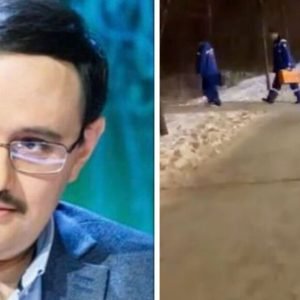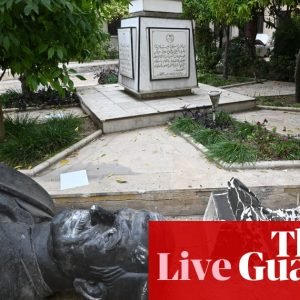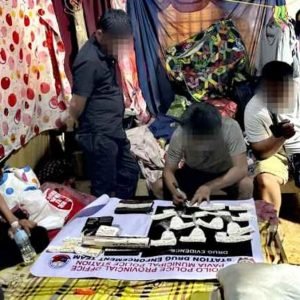
Opening summary
Hello and welcome to the Guardian’s live coverage of the crisis in the Middle East.
The ceasefire between Israel and Hezbollah is looking increasingly fragile after both sides exchanged fire and accused each other of violating the US-brokered truce less than a week after it came into force.
At least nine people were killed and three injured on Monday from Israeli strikes on two southern Lebanese towns, Talousa and Haris, as the Israeli military said it struck dozens of Hezbollah targets throughout Lebanon.
The latest Israeli strikes came shortly after Hezbollah accused Israel of violating the ceasefire and fired missiles on an Israeli military position in the disputed Shebaa Farms area in what the Iran-backed group called a “defensive warning strike”.
Lebanese speaker of parliament Nabih Berri, a Hezbollah ally who negotiated the truce on behalf of Lebanon, said Beirut had recorded at least 54 ceasefire violations by Israel since Wednesday.
In other developments:
-
US president-elect Donald Trump demanded the immediate release of Israeli hostages still being held in Gaza, saying that if they are not freed before he is sworn into office for a second term there will be “hell to pay”
-
A wave of airstrikes pummelled hospitals and neighbourhoods in the rebel-held region of Idlib in northern Syria as Islamist insurgents continued to battle forces loyal to Bashar al-Assad after the militants’ lightning assault on Aleppo. At least 18 people were killed and 35 injured, White Helmets civil defence forces based in Idlib said
-
Iranian-backed Iraqi militias crossed into eastern Syria overnight in an attempt to shore up struggling forces loyal to Damascus, battling an insurgency that has swept much of the country’s north-west as Islamist militants seized control of Aleppo.
-
The crisis in Syria is the result of President Bashar al-Assad’s refusal to engage in political dialogue with the opposition, and not external interventions, the Turkish foreign minister, Hakan Fidan, said after meeting his Iranian counterpart, Abbas Araghchi, for emergency talks in Ankara
-
The Hamas-led health authority in Gaza has said at least 44,466 Palestinians were killed and 105,358 wounded since Israel’s military offensive on Gaza began after the 7 October 2023 surprise attack inside Israel
Key events
Israel’s military has issued a statement in which it claims that troops operating in the central corridor of the Gaza Strip over the last two weeks have killed seven named participants in the surprise 7 October 2023 Hamas attack inside southern Israel.
It said its forces “conducted several targeted raids in the area, during which they dismantled Hamas military terror sites, including military structures, observation posts, and sniper positions.”
The claims have not been independently verified.
Israel’s air force has said it carried out an airstrike in the Bekaa area of Lebanon.
On Monday, speaker of the parliament of Lebanon, Nabih Berri, accused Israel of over 50 breaches of the ceasefire deal that came into force on 27 November, which Israel has denied.
More details soon …
Palestinian news agency Wafa reports that Israeli security forces have detained 18 people in the Israeli-occupied West Bank since last night. It reports over 11,900 people have been arrested by Israeli forces in the occupied West Bank and occupied East Jerusalem since 7 October 2023.
Syria’s state news agency Sana has reported an Israeli airstrike that targeted a vehicle on a road leading to Damascus international airport.
More details soon …
Israeli media reports that the cabinet is set to meet in the coastal city of Nahariya on Tuesday, a symbolic show of renewed security in the north after the ceasefire deal with Lebanon came into effect.
The move has received some criticism, however, with Hebrew news site Ynet reporting that the heads of local authorities in the north of Israel are angry that they have not been invited to participate.
Reuters reports that Israeli military strikes have killed at least 12 Palestinians across the Gaza Strip so far on Tuesday, most of them in the town of Beit Lahiya, as the IDF issued new forced evacuation orders in the south of the territory.
Reuters cited local medics for the casualty figures, which have not been independently verified. Eight people had been killed in a series of strikes in Beit Lahiya where the Israeli army has been operating since October.
The Israeli army issued evacuation orders to residents in northern districts of Khan Younis, citing the firing of rockets from those areas. It said civilians should move to “the humanitarian zone”. Palestinian and UN officials say there are no safe areas in Gaza, where most of the population of 2.3m has already been internally displaced multiple times.
Palestinian news agency Wafa reports that three of the victims in Beit Lahiya were members of the Al-Masry family, killed “while they were going to inspect their homes.”
Tareq Abu Azzoum, reporting from Deir el-Balah in central Gaza for Al Jazeera, writes that “In Gaza City, a four-storey building was destroyed. Dozens of civilians are feared trapped under the rubble. Civil Defence forces, with the help of civilians, are trying to find survivors from the debris.”
Al Jazeera has been banned from operating inside Israel by Benjamin Netanyahu’s government.
Iran’s official news agency IRNA, citing foreign minister Abbas Araghchi, reports that the foreign ministers of Iran, Russia and Turkey will meet in Doha, Qatar, at the weekend to discuss the crisis in Syria.
Unicef’s MENA regional director Edouard Beigbeder has issued a statement about the recent escalation of violence in Syria, saying “children are bearing the heaviest brunt of the conflict.”
I am deeply alarmed by the recent escalation of hostilities in northwest Syria, which has reportedly resulted in the tragic killing of at least seven children and injured another 32.
Since 27 November, more than 48,500 people have been displaced, mainly children and women. Most of the children have been uprooted multiple times due to previous crises.
In Syria, children are enduring one of the world’s most complex emergencies, a combination of protracted hostilities, repeated displacement of civilians, economic recession, disease outbreaks, and devastating earthquake. Unicef calls on all parties to cease hostilities immediately.
If you wanted some background reading on the conflict in Syria, then over the past few hours we have published two useful explainers. This map and article explain who controls territory on the ground in the country.
Additionally my colleague Jason Burke has this piece explaining how Syrian militants HTS seized Aleppo so quickly. Here is an excerpt:
This sudden turn of events is shocking but not entirely surprising, veteran observers say. “Everyone watching Syria knows it has been a tinderbox under very great pressure both domestically and from regional powers for years. The war has been continuing in the background” said Charlie Winter, a Syria expert and director of ExTrac, a UK-based risk intelligence platform.
You can read more from Jason Burke here: Why did Syrian militants HTS seize Aleppo – and how did they do it so quickly?
The Syrian army and allied forces confronted an attack launched by forces affiliated with the Syrian Democratic Forces (SDF) alliance on villages in the northern countryside of Deir ez-Zur province on Tuesday, Reuters reports, citing the state news agency Sana.
The Kurdish-led SDF formed in 2015, and are considered the Kurds’ de facto army. The forces are an alliance of fighters including Kurds, Syriac Christians and Arab Muslim factions.
The SDF holds around a quarter of Syrian territory, and is considered the second most powerful military force after the army.
Turkey considers the SDF to be a terrorist group.
Al Jazeera reports that, since dawn, eight people have been killed in Gaza by Israeli strikes. Five have been killed in Beit Lahiya, two in Gaza City, and one in Rafah.
The claims have not been independently verified. It has not been possible for journalists to independently verify the casualty figures being issued during the conflict.
Israel this morning has reiterated its warning to Lebanese civilians that it is prohibiting their return to dozens of villages in the south of the country.
In a statement overnight, Israel’s military claimed that its attacks inside Lebanese territory “struck Hezbollah terrorists, dozens of launchers, and terrorist infrastructure throughout Lebanon.”
It said:
Hezbollah’s launches tonight constitute a violation of the ceasefire agreement between Israel and Lebanon. The state of Israel demands that the relevant parties in Lebanon fulfil their responsibilities and prevent Hezbollah’s hostile activity from within Lebanese territory. The State of Israel remains obligated to the fulfilment of the conditions of the ceasefire agreement in Lebanon. The IDF is prepared to continue operating wherever necessary and will continue to operate to defend Israeli civilians.
Hello and welcome to the Guardian’s live coverage of the crisis in the Middle East.
The ceasefire between Israel and Hezbollah is looking increasingly fragile after both sides exchanged fire and accused each other of violating the US-brokered truce less than a week after it came into force.
At least nine people were killed and three injured on Monday from Israeli strikes on two southern Lebanese towns, Talousa and Haris, as the Israeli military said it struck dozens of Hezbollah targets throughout Lebanon.
The latest Israeli strikes came shortly after Hezbollah accused Israel of violating the ceasefire and fired missiles on an Israeli military position in the disputed Shebaa Farms area in what the Iran-backed group called a “defensive warning strike”.
Lebanese speaker of parliament Nabih Berri, a Hezbollah ally who negotiated the truce on behalf of Lebanon, said Beirut had recorded at least 54 ceasefire violations by Israel since Wednesday.
In other developments:
US president-elect Donald Trump demanded the immediate release of Israeli hostages still being held in Gaza, saying that if they are not freed before he is sworn into office for a second term there will be “hell to pay”
A wave of airstrikes pummelled hospitals and neighbourhoods in the rebel-held region of Idlib in northern Syria as Islamist insurgents continued to battle forces loyal to Bashar al-Assad after the militants’ lightning assault on Aleppo. At least 18 people were killed and 35 injured, White Helmets civil defence forces based in Idlib said
Iranian-backed Iraqi militias crossed into eastern Syria overnight in an attempt to shore up struggling forces loyal to Damascus, battling an insurgency that has swept much of the country’s north-west as Islamist militants seized control of Aleppo.
The crisis in Syria is the result of President Bashar al-Assad’s refusal to engage in political dialogue with the opposition, and not external interventions, the Turkish foreign minister, Hakan Fidan, said after meeting his Iranian counterpart, Abbas Araghchi, for emergency talks in Ankara
The Hamas-led health authority in Gaza has said at least 44,466 Palestinians were killed and 105,358 wounded since Israel’s military offensive on Gaza began after the 7 October 2023 surprise attack inside Israel
Israel kills 12 people in Gaza and issues more forced evacuation orders
Unicef: 48,500 people displaced by renewed fighting in Syria
Explainer: Who controls what territory in Syria?
Syrian army and Kurdish SDF forces reported fighting in Deir ez-Zur
Opening summary






